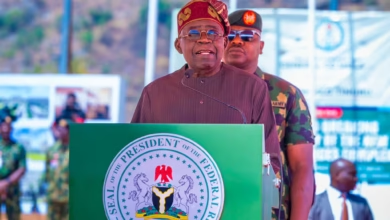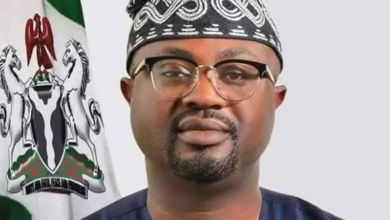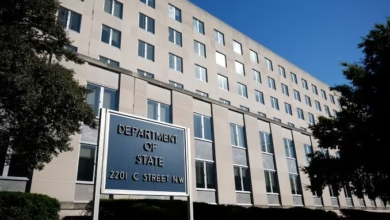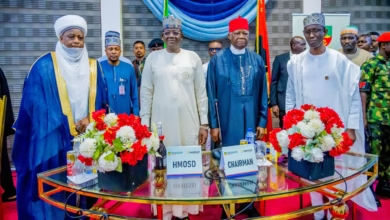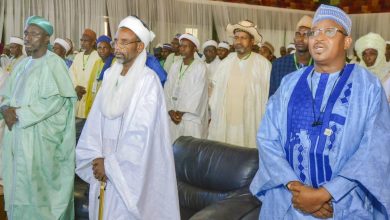NewsPress release
NEC Briefed on Why FAAC Meeting Deadlocked and Hopes of its Resumption Soon
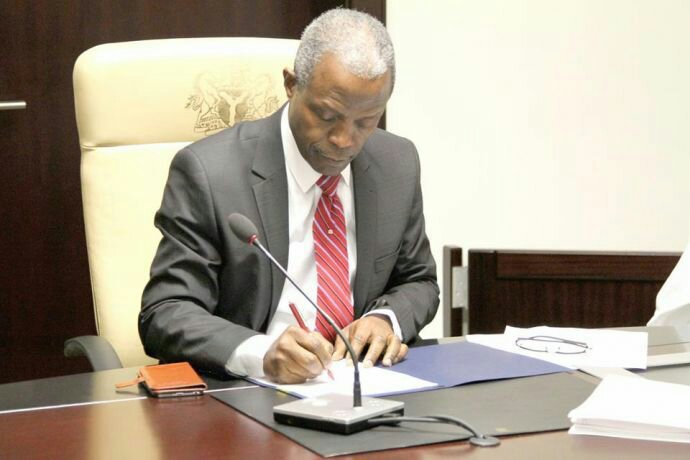
Members of the National Economic Council chaired by Vice President Yemi Osinbajo, SAN, were briefed today at its monthly meeting on why the recent monthly meeting of the Federation Allocation Account Committee (FAAC) was deadlocked and there is hope the meeting would reconvene soon.
Below are highlights of the NEC meeting:
FAAC UPDATE
The Honourable Minister of Finance briefed the Council on the reported deadlock of the Federation Allocation Account Committee, FAAC, which she chairs.
She briefed that the issue was about NNPC remittance figures which the committee found unacceptable. She, however, assured NEC that the FAAC meeting will reconvene very soon.
REPORT ON EXCESS CRUDE ACCOUNT (ECA)
The Honourable Minister of Finance also reported to the Council that $80.6 million has been added to the ECA, and that the balance in the Excess Crude Account (ECA) as at June 26, 2018 stands at $1,916, 742,289. 60
UPDATE ON STABILIZATION FUND ACCOUNT
Honourable Minister of Finance reported to the Council that the current balance in the Stabilization Account as at JUNE 26, 2018 stands at N18, 892,864,216.65
UPDATE ON NATURAL RESOURCES DEVELOPMENT FUND
Honourable Minister of Finance equally reported to the Council that the current balance in the Natural Resources Development Fund as at June 28, 2018 stands at N133,715,427,387.37
Decision on Stabilization Fund
Council appointed a Committee of 4 comprising Governors of Kaduna, Kogi, Ebonyi and Lagos to review the administration and operation of the Stabilization Fund Account.
PRESENTATION ON ANNUAL REPORT AND ACCOUNTS OF THE NIGERIA SOVEREIGN INVESTMENT AUTHORITY (NSIA) FOR THE YEAR ENDED 2016 AND UPDATE ON 2017 ACTIVITIES
NSIA reported 5th straight year of profitability in all its funds with core profits (excluding FX transaction gains) of N26.28 billion ($88 million) for the year.
NSIA also reported that total assets under management was about US$1.25 billion for the most part of the year, as the additional contribution of $250 million was not received until the third quarter of 2017.
It also reported that the return on asset was up to 6.60% in dollar terms.
NSIA is shifting focus to infrastructure and direct investments in Nigeria.
2017 Activities – NSIA activities among others:
NSIA implemented the Presidential Fertilizer Initiative (PFI) in 2017.
Commenced construction of first three healthcare projects in Lagos, Kano and Umuahia respectively.
Continued work on Second Niger Bridge Projects.
Invested in and own 13% of Bridge International Academics Ltd – a network of Schools which delivers affordable high-quality Primary education to lower-income families.
Invested in Babbar-Gona – an agricultural franchise that empowers smallholder farmers.
NSIA in 2018, will focus on executing infrastructure investments strategy in its core focus areas of Power, Toll Roads, Agriculture and Healthcare etc., in addition to exploring opportunities in other sectors of investment such as refining, transport infrastructure and industrial real estate.
Decision
Council resolved that account of NSIA be approved.
EDUCATION MINISTERIAL STRATEGIC PLAN
PRESENTATION ON THE NATIONAL EDUCATION POLICY- PROSPECTS, CHALLENGES AND WAY FORWARD BY THE HON MINISTER OF EDUCATION:
Minister of Education presented a Ministerial Strategy Plan (MSP) (2016 – 2019) for the Education Sector to the Council
The presentation centred on the achievements, challenges and way forward in the Education Sector.
The Ministerial Strategy Plan (MSP) 2016 – 2019 has 10 pillars as follows:
– Out of School Children
– Youth and Adult literacy
– Science, Technology, Engineering and Mathematics (STEM) and Technology, Vocation Education and Training (TVET)
– Basic Education
– Teacher Education, Capacity Building and Professional Development
– Curriculum Policy Matters
– Tertiary Education
– Education Data and Planning
– ICT in Education and
– Library Services.
· The presentation highlights the need for effective collaboration, cooperation and coordination by all stakeholders to consolidate the gains and successfully implement the reforms in the Ministerial Strategy Plan (MSP) 2016 – 2019.
· It also recognised that more investment is needed in the education sector, while emphasizing that collaboration among the Federal, States, Local Governments, Private Sector and Development Partners is very necessary.
Decision
Council noted that the standard of basic education at the State level has fallen drastically and resolved that a Committee comprising Governors of Kano, Osun, Delta, Anambra, CBN Governor and the Honourable Minister of Education should look into what needs to be done urgently in the education sector at the State level and report back to the Council.
UPDATE ON THE IMPLEMENTATION OF THE NATIONAL ADDRESSING SYSTEM BY THE MINISTER OF COMMUNICATION TECHNOLOGY
Highlights of the Presentation:
The National Addressing Policy (NAP) was developed by the Ministry of Communication Technology in conjunction with the Stakeholders and was approved by the Federal Executive Council (FEC) on November 27th, 2013
The policy provided the governance structure and membership in the National Addressing System Council, NAS Committee, NAS Secretariat; as well as list of strategic stakeholders
NAP Governance Structure has the Vice President as its Chairman and 18 other members, and among its function is to make guidelines and provide strategic direction for the National Addressing System
NAS Committee is headed by the Honourable Minister of Communication as Chairman, with 16 other members cutting across multi-discipline, inter-agency and inter-sect oral, which function among others is to develop the implementation framework for NAS programme.
Objectives of the NAP Policy include;
· To harness physical development in LGs to ensure orderliness through spatial development strategies and processes
· To facilitate increase of the proportion of Nigerians to be formally assigned street addresses that can be authenticated in local govts’ databases where they reside
· To develop a standardized and globally acceptable addressing infrastructure that support; Easy identification of locations on Geographic Information System platform, National development and enhanced socio-economic activities
Funding: NAS funding will be provided by the FG, States and LGs. Other sources are; Levies, Tariff, MDG, Donations from private/public Corporate Organizations
Update on Implementation of NAS:
· Nigerian National Addressing Standards and Guidelines (NNAS&G) was developed and approved by NAS Council in October 2017 in line with the provisions of the policy
Council invited to:
· Consider and approve the proposed National Addressing Data Ecosystem Architecture for the implementation of the National Addressing System (NAS).
· Consider and accord high priority status for the implementation of the NAS program, and
· Support the full implementation of the NAS programs with adequate funds.
Decision
Council approved the prayers and sample of organising address format.
ANY OTHER BUSINESS (AOB)
Council also condoned with the Plateau State Government over the recent tragedy on the state and prayed God to comfort those affected by the conflict.

